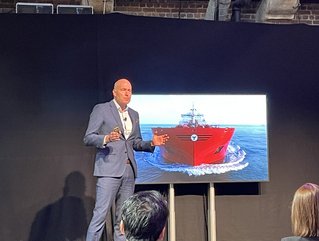Access to green energy is shipping's greatest challenge

Accessing green energy presents shipping with its greatest challenges in a net zero era, according to Øistein Jensen, Chief Sustainability Officer at Odfjell, one of the world's largest chemical tanker operators.
Speaking at the second day of Sustainability Live in London, he highlighted the availability of zero emission fuels as a key impediment to combating carbon emissions and warned there is no quick fix.
"Producing green fuels requires access to renewable energy on a scale that is not available today," he said. "We must understand alternative fuels but not bet on one of them. Ammonia is toxic and requires a lot of regulation, while hydrogen has a low energy density. For fuel cells, we're looking at 2030 before they will be used on a commercial scale, and the total footprint for biodiesel is 239% bigger than the fuel we're using today."
The financial cost of decarbonising shipping is estimated at between US$1.4trn-1.9trn and 87% of the cost will be tied up in changing onshore supply chains - in a world where 90% of the world's goods travel by sea. In energy terms, it would equate to 5,400TW - more than 50% of all available non-fossil fuel production today.
"Then the question arises that if that renewable energy was available, where would you put it - cement and steel, or shipping?"
Price is another important factor and fuels have to be competitive, he added. "There has to be a tax on fuel - a carbon levy and trading scheme on carbon to drive incentives."
Odjfell's 80-plus tankers call at more than 400 different ports and transport 14mn tonnes of cargo annually. It is deploying a 'fuel flexible approach' and constantly looking at ways to make its fleet more efficient, aiming to reduce its carbon intensity by 40% by 2030 and 50% of 'absolute' emissions by 2050.
Safety and sustainability are at the heart of its operations. Onshore in the USA, Belgium, China, and Korea, its terminals’ teams operate a total of 470 tanks with a capacity of 1.3mn cubic metres - equivalent to 7.6mn bathtubs.
Despite the decarbonisation challenges facing the shipping industry, he ended the presentation on an upbeat note, saying the transition presents a "tremendous opportunity" for start-ups to develop sustainable solutions.






